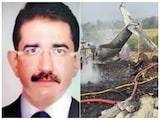Former Israel Prime Minister Ehud Olmert has urged his country to show restraint after Iran's drone and missile attack Sunday, arguing that a nearly 99 per cent interception rate (by Tel Aviv and its allies) resulted in a "dramatic victory for the efficiency of the Israeli air defence" and "great humiliation for the Iranians". Speaking to NDTV, Mr Olmert also called for an end to the war in Gaza - in which the death count is at an estimated 34,000 - and called for "comprehensive peace... based on the two-state solution".
On the attack by Iran - which has led to significantly raised tension in the Middle East and concern over a rapid escalation of military conflict that could involve the West - Mr Olmert also indicated he believed Tehran's statement. The Iranian army on Sunday said its operation - retaliation for Israel's deadly strike on Iran's consulate in Syria's Damascus - had "achieved all its objectives".
"We defeated Iran on Saturday (when anti-missile defences shot down all but seven of the 300 missiles and drones fired by Tehran)... we humiliated Iran. So, what was initially a provocation of the worst possible kind by Iran against the State of Israel... turned out to be a dramatic victory for the sophistication (and) efficiency of Israeli air defences. So they (the Israeli government) don't need (to respond). In my mind we have won... we don't need to carry on this confrontation," Mr Olmert said.
READ | Israel Used Multi-Layered Shield To Block Iran Attack. How It Works
"I have to say... the Iranians are quite credible. When they announced they will attack, they did. So now, when they announce they have finished... I want to take them seriously," he said.
The ex-Prime Minister, however, stressed that Tel Aviv "as you can imagine (will) keep its eyes and ears open, and all systems ready in the event that someone, for whatever reason, decides to attack".
"But I hope they look at it as a full stop for them... and my advice to the Israeli government is that we don't (now) need to react," Mr Olmert told NDTV.
READ | Iran Warns Of "Stronger Response" If Israel Retaliates To Attack
The Iranian side has also urged Israel to think twice about a retaliatory strike. Its mission to the United Nations said on X (formerly Twitter) "the matter can be deemed concluded". "However, should the Israeli regime make another mistake, Iran's response will be considerably more severe."
The UN has also warned the international community against escalation. Secretary-General Antonio Guterres told the Security Council "neither the region nor the world can afford more war".
An estimated 99 per cent of Iran's missiles and drones were intercepted. Those that snuck past its defences caused minimal damage; only 12 injuries have been reported and no deaths.
Iran said its attack was in response to the April 1 strike on its consulate in Damascus, which was widely blamed on Israel. That attack killed seven Iranian Revolutionary Guards.
Ehud Olmert On Israel-Gaza War
On the Gaza offensive, Mr Olmert acknowledged Israel's military offensive, following Hamas' brutal October 7 attack, affected many innocent Palestinians, and said "we have no desire to hit non-involved (people)". "... Hamas attacked innocent civilians... in their homes. They raped, butchered, beheaded... they did the most horrible things to innocent civilians. We have no such policy."
He pointed out that the global community, including the United States, European nations like France and the United Kingdom, and Prime Minister Narendra Modi, accepted Israel's right to respond to the attack by Hamas, but did not, it appeared from the ensuing criticism, factor in civilian casualties.
"... all of the world leaders, including, by the way, your Prime Minister... all said Israel had the right to react. When they said it they knew Hamas is embedded in urban centres in Gaza, where thousands of civilians are crowded, and that it was almost impossible to think of an Israeli counter-attack in Gaza without having civilian casualties (or) non-involved civilian casualties, as it turned out..."
"We recognize that many Palestinians were affected as a result of this operation. I can only tell you what I feel and know... that an overwhelming majority of Israelis feel this way. We have said 'sorry' and that we are prepared to do everything possible to assist civilians uprooted, largely and primarily, as a result of Hamas' actions," the former Israeli leader told NDTV.
Gaza End Game For Israel?
On a possible end game for Israel's assault on Gaza, Mr Olmert said that while he had his thoughts on the matter, the decision was in the hands of Israel PM Benjamin Netanyahu and his government.
"I think we have reached a point where we can stop the war. We have not eliminated every Hamas member... but to the extent you can destroy a terrorist organisation, we did it. I think Hamas is almost completely broken... most of their tunnels, missiles, fighters. They are bleeding now and unable to resume the same kind of command and political influence in Gaza they had."
"So this is the right time for Israel to stop the war... to make an agreement, bring back the hostages."
An International Peace Force
Mr Olmert also called for the creation of an "intervention force", possibly formed with help from countries like the US and India, to maintain peace and prevent Hamas from re-forming.
"Gaza Is Not Israeli..."
In a significant comment, Mr Olmert also said, "Gaza is not Israeli... Gaza is part of the Palestinians and it has to be ruled by the Palestinians", and called on Israeli authorities to "embark on negotiations for comprehensive peace between us and the Palestinians, with a Palestinian body".
Such a body, Mr Olmert said, would be acceptable to the Palestinians and the international community.
"I think this has to be part of any regional agreement... which will include Saudi Arabia and, of course, the (United Arab) Emirates, which already have a peace with the Israel. This war has been tragic for us and for many Palestinians (and this) can be starting point for peace talks," he said.
Mr Olmert argued a push for peace at this juncture could "change the balance in the Middle East and, hopefully, create stability (in the region). He also stressed "negotiations between us and Palestinians will have to be based on a two state solution".
Israel-Gaza Peace Talks
Mr Olmert's comments come days after Israel allowed the return of Palestinians displaced from the northern Gaza Strip as part of ongoing truce talks; this was reportedly a core demand by Hamas.
Israel and the Hamas are engaged in prolonged (and sometimes stuttering) peace talks mediated by Egypt and Qatar. According to a Times of Israel report Sunday, Hamas has asked for a six-week ceasefire before it releases a first tranche of hostages taken after October's attack. In return, the Israel military will withdraw from urban areas, allowing displaced civilians to return home.
Two further six-week ceasefires will follow, Hamas proposed, before a permanent end to the fighting.















